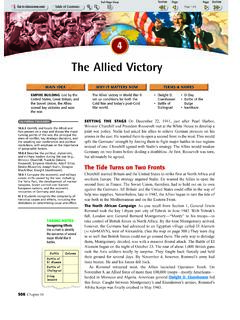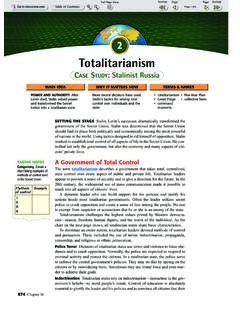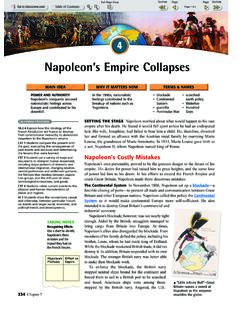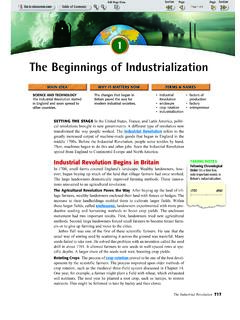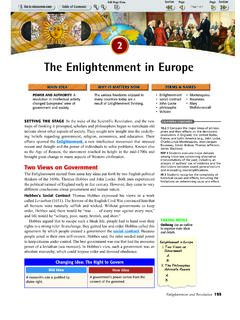Transcription of The Legacy of Ancient Greece and Rome
1 MAIN IDEAWHY IT MATTERS NOWTERMS & NAMESPOWER AND AUTHORITYTheGreeks developed democracy,and the Romans addedrepresentative and citizenparticipation are importantfeatures of democraticgovernments around the world. government monarchy aristocracy oligarchy democracy directdemocracy republic senate1 SETTING THE STAGET hroughout history, people have recognized the needfor a system for exercising authority and control in their society. Small bands ofpeople often did not need a formal organization. Councils of elders, for example,worked together to control a group. However, most people in larger groups livedunder rulers, such as chieftains, kings, or pharaohs, who often had total the course of thousands of years, people began to believe that even in largegroups they could govern themselves without a powerful ruler.
2 Athens Builds a Limited DemocracyAbout 2000 , the Greeks established cities in the small fertile valleys alongGreece s rocky coast. Each city-state had its own government, a system for con-trolling the Greek city-states adopted many styles of government. In some, a singleperson called a king or monarch ruled in a government called a adopted an aristocracy(AR uh STAHK ruh see), a government ruled bya small group of noble, land-owning families. Later, as trade expanded, a newclass of wealthy merchants emerged in some cities. Sometimes these groups tookpower or shared it with the nobility. They formed an oligarchy, a governmentruled by a few powerful people. Ancient Greek civilization claims the distinction of developing the firstdemocracy in a country.
3 In fact, the word democracy, meaning rule of the peo-ple, comes from the Greek words demos, meaning people, and kratos, mean-ing power. Building DemocracyAthens was the largest and most powerful city-state toemerge in Greece . In Athens, citizens participated in governmental decision mak-ing. Citizens were adult male residents who enjoyed certain rights and responsi-bilities. Each year, an assembly of citizens elected three nobles to rule the a year of service, the nobles became part of a larger council of 600 , Athens suffered severe economic problems. In order to paytheir debts, poor farmers pledged part of their crops to wealthy landowners. Theylater pledged their land. Then, they sold themselves into slavery and were notable to leave the land.
4 Eventually, a strong leader stepped in to deal with thepolitical and economic Legacy of Ancient Greece and RomeDetermining Main IdeasUse a web diagram torecord the contributionsof Greece and Rome to NOTESG reeceRomeDemocracyThe Rise of Democratic Ideas5 CALIFORNIA the development of theWestern political ideas of the rule of lawand illegitimacy of tyranny, using selectionsfrom Plato s Republicand Aristotle s 1 Students compare the present withthe past, evaluating the consequences ofpast events and decisions and determiningthe lessons that were 1 of 7 GovernmentEvery society must create ways to regulate the behaviors of its consists of the people and institutions with the authority toestablish and enforce rules for society.
5 The rules are designed to keep orderwithin the society, to promote the behaviors that the society approves of, andto protect the society from outside dangers. The government has the authorityto administer punishments if the rules are broken. Different societies haveforms of government that may feature different types of leaders, lawmakers,and enforcers, such as police or the military. RESEARCH LINKSFor more on forms of government, go to Early Democracy:The Igbo People The Igbo (IHG boh) people alsocalled Ibo of southern Nigeria inAfrica practiced a form ofdemocracy as early as the ninthcentury. Igbo village governmentwas made up of a council ofelders and a village assembly. Inthe council, any adult male couldtake part in discussion, althoughthe elders made the finaldecisions.
6 In the assembly,everyone young or old, rich orpoor had the right to speak. Thispractice encouraged a spirit ofequality among the Monarchies (countries under the protection of others) 1%Democracies 62%Authoritarian/ Totalitarian Regimes (often one-party states or dictatorships) Facts Theoretically, 40,000 peoplecould attend the GreekAssembly. In practice, about6,000 people attended. In 1215, King John ofEngland granted the MagnaCarta, which largelyinfluenced subsequentdemocratic thought. In the 1970s, there were 40democratic governmentsworldwide. In 2002, over 120established and emergingdemocracies met to discusstheir common which forms ofgovernment is rule based on wealth or property ownership?
7 See Skillbuilder Handbook, page might the mass media in modern life help make democracy an achievable form of government? Monarchy Aristocracy Oligarchy Direct Democracy State ruled by a king Rule is hereditary Some rulers claim divine right State ruled by nobility Rule is hereditary and based on family ties, social rank, wealth Social status and wealth support rulers authority State ruled by a small group of citizens Rule is based on wealth or ability Ruling group controls military State ruled by its citizens Rule is based on citizenship Majority rule decides voteMajor Forms of GovernmentAbujaAccraLom N'DjamenaNiameyYaound BENINBURKINAFASOCHADCAMEROONGABONEQUATOR IALGUINEAGHANAMALINIGERNIGERIATOGOIgbo landsIgboSource.
8 Adapted from Democracy's Century,Freedom House online (2003)CALIFORNIA , REP 4 Page 2 of 7 Reforms of SolonIn 594 , Solon (SO luhn), a respectedstatesman, passed a law outlawing slavery based on debt andcanceled the farmers debts. This simple act enabled Athensto avoid revolution or civil continued his policies of political reform. He estab-lished four classes of citizenship based on wealth rather thanheredity. Only citizens of the three higher classes were able tohold public office. Yet, even the lowest class of citizens couldvote in the assembly. All free adult males were also created a new Council of Four Hundred. Thisbody prepared business for the already existing also introduced the legal concept that any citizencould bring charges against these acts increased participation in govern-ment, Athens was still limited as a democracy.
9 Only citizenscould participate in government, and only about one-tenth ofthe population were citizens at the time. Athenian lawdenied citizenship to women, slaves, and foreign formed about one-third of the Athenian Enacts more ReformsBeginning in 508 ,the Athenian leader Cleisthenes (KLYS thuh neez) intro-duced further reforms. Because of his reforms, Cleisthenes isgenerally regarded as the founder of democracy in worked to make Athens a full democracy by reorganizingthe assembly to balance the power of the rich and poor. Healso increased the power of the assembly by allowing all cit-izens to submit laws for debate and passage. Cleisthenesthen created the Council of Five Hundred.
10 The Council proposed laws and counseled the members were chosen at random from among thecitizens. These reforms allowed Athenian citizens to partic-ipate in a limited democracy. However, still only one-fifthof Athenian residents were actual citizens. Greek Democracy ChangesFrom 490 to 479 , the Greeks fought Persian invaders who were attempting toconquer Greece . The Greek city-states fought side by side as allies and defeated thePersian forces. The Athenians maintained democracy during the Persian Wars by holding pub-lic debates about how to defend their city. After Persia s defeat, Athens continuedto develop democracy. A wise and able statesman named Pericles led Athens for 32years, from 461 to 429 Strengthens DemocracyPericles strengthened Greek democracy byincreasing the number of paid public officials and by paying jurors.
